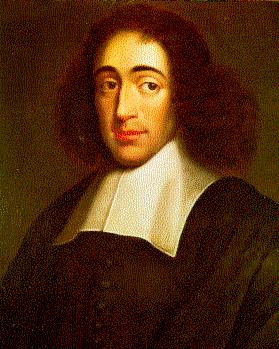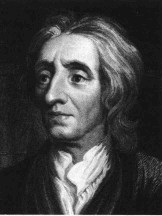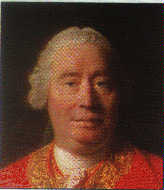







![]()
The Modern Philosophy Graduate Seminar examines significant figures of 17th- and 18th-century philosophy, with emphasis on a careful examination of texts. Although the seminar provides a general overview of philosophic issues of the period, it also focuses on a particular theme. This year's theme centers on the concept of nature.
Texts: Modern Philosophy: An Anthology of Primary Sources,
ed. Roger Ariew and Eric Watkins.
A Companion
to Early Modern Philosophy, ed. Steven Nadler.
|
Class date |
Topic |
Nadler reading |
Ariew/ Watkins reading |
Presenter |
|
| Sept. 1 | A. B. |
Aristotelian Scholasticism, Renaissance Platonism, New Science, Gassendi, Bacon | 1-59 80-95, 298-307 |
4-11 | Dr.
Daniel |
| Sept. 8 | A. B. |
Descartes:
Method/Self (Meditations I-II) Descartes: God/Truth (Meditations III-IV) |
60-79 | 12-34, 56-62 34-45, 63-70 |
Johnathan
Bindel James Taylor |
| Sept. 15 | A. B. |
Descartes: Essence/Existence (Med. V-VI) Arnauld | 60-79 113-28 |
45-55 57, 70-80 |
Manuela
Gomez Bob Stanberry |
| Sept. 22 | A. B. |
Hobbes Grotius, Pufendorf |
320-37 210-24 |
100-121 |
Steve
Campbell Gregory Bergeron |
| Sept. 29 | A. B. |
Malebranche Cartesians |
152-66 129-51, 167-209 |
389-412 |
Cale
Harfoush Jennifer Parks |
| Oct. 6 | A. B. |
Spinoza:
Method and
God Spinoza: Mind and Freedom |
225-46 | 97-99, 122-49 149-80 |
Shaun
Miller Dave Wiens |
| Oct. 13 | A. B. |
Bayle Leibniz: Discourse, Arnauld letters |
247-59 260-79 |
486-90 181-224 |
Joel
Barton James Taylor |
| Oct. 15 (Friday) |
First paper due 5:00 p.m. |
||||
| Oct. 20 | A. B. |
Leibniz:
Primary Truths to Monadology British Philosophy to Cambridge Platonists |
260-79 283-97 |
225-43, 374-85 |
Mark
Bernier Mike Jones |
| Oct. 27 | A. B. |
Boyle
and Newton Locke |
338-53, 388-403 354-74 |
244-48, 262-69 270-373 |
Shaun
Miller Mark Bernier |
| Nov. 3 | A. B. |
English
Malebrancheans English Women Philosophers |
375-87 404-22 |
Cale
Harfoush Manuela Gomez |
|
| Nov. 10 | A. B. |
Berkeley:
Principles & Dialogues Berkeley: De Motu, Alciphron, Siris |
437-55 | 386-88, 413-61 478-82 |
Mike
Jones Joel Barton |
| Nov. 17 | A. B. |
Shaftesbury/Mandeville/Hutcheson Hume & Smith on Ethics |
425-36 456-82 |
Jennifer
Parks Dave Wiens |
|
| Nov. 24 | A. B. |
Hume
on Epistemology Reid & Vico |
527-41, 562-71 |
483-85, 491-572 |
Steve
Campbell Johnathan Bindel |
| Dec. 1 | A. B. |
Kant
on Epistemology Rousseau & Kant on Ethics |
586-608 |
573-633 |
Gregory
Bergeron Bob Stanberry |
| Dec. 15 (Wednesday) | Term
paper due in
office, 5:00 p.m. |
||||
Office: Bolton 302 B
Office hours: Monday & Wednesday 1:00 - 4:00 p.m.
Phone: 845-5619 (office), 846-4649 (home)
Email:
sdaniel@people.tamu.edu
Website: http://people.tamu.edu/~sdaniel/616sy04c.html
Seminar Theme
Seventeenth- and eighteenth-century philosophers differ significantly on what they mean by the terms "nature" and its variants (e.g., human nature, natural law, natural right), and their differences have generated a good deal of disagreement among historians about how to interpret their texts. Sometimes nature is understood as something extra-mental; other times, it includes all things (including mind) and is even equated with God.
For early modern thinkers, this discussion situates the ontological and epistemological characterization of nature within religious, ethical, and political contexts. So even though some of our readings might not seem to deal with metaphysical or epistemological questions about nature, in fact all of them bear on the issue.
Assignments/Presentations/Papers/Grades
At each class meeting a member of the seminar will prepare a 4- to 6-page outline of selected passages from the text and other writings by the philosophers under discussion that shed light on the seminar theme. Each student will lead the discussion twice during the semester. Together, these outline presentations count for 30% of the semester grade.
By mid-semester you will also be responsible for completing a 10-page paper on the concept of nature as addressed by one of the philosophers studied (another 30% of the final grade).
The final term paper will be a more in-depth (20-page) paper on that same topic dealing with a different philosopher than the one addressed in the short paper. For this paper, most students end up writing on a figure for whom they have prepared a presentation, but it is not required that the selected thinker be one that we study studied in class. The final paper is worth 40% of the final grade.

 Send Dr. Daniel a message:
sdaniel@people.tamu.edu
Send Dr. Daniel a message:
sdaniel@people.tamu.edu
 Go to the Texas A&M Philosophy
Home Page
Go to the Texas A&M Philosophy
Home Page
Students with disabilities are guaranteed a learning environment that provides for reasonable accommodation of their disabilities. If you believe you have a disability requiring an accommodation, please contact the Department of Student Life, Disability Services, Koldus Bldg. 126, or call
845-1637.
Students are bound by the Aggie honor code not to cheat. Submitting another student's work as one's own, copying from another student's test, and modifying a previously graded test to improve the grade are acts of scholastic dishonesty. For the definition and sanctions regarding cheating and plagiarism, see http://www.tamu.edu/aggiehonor/definitions.php.